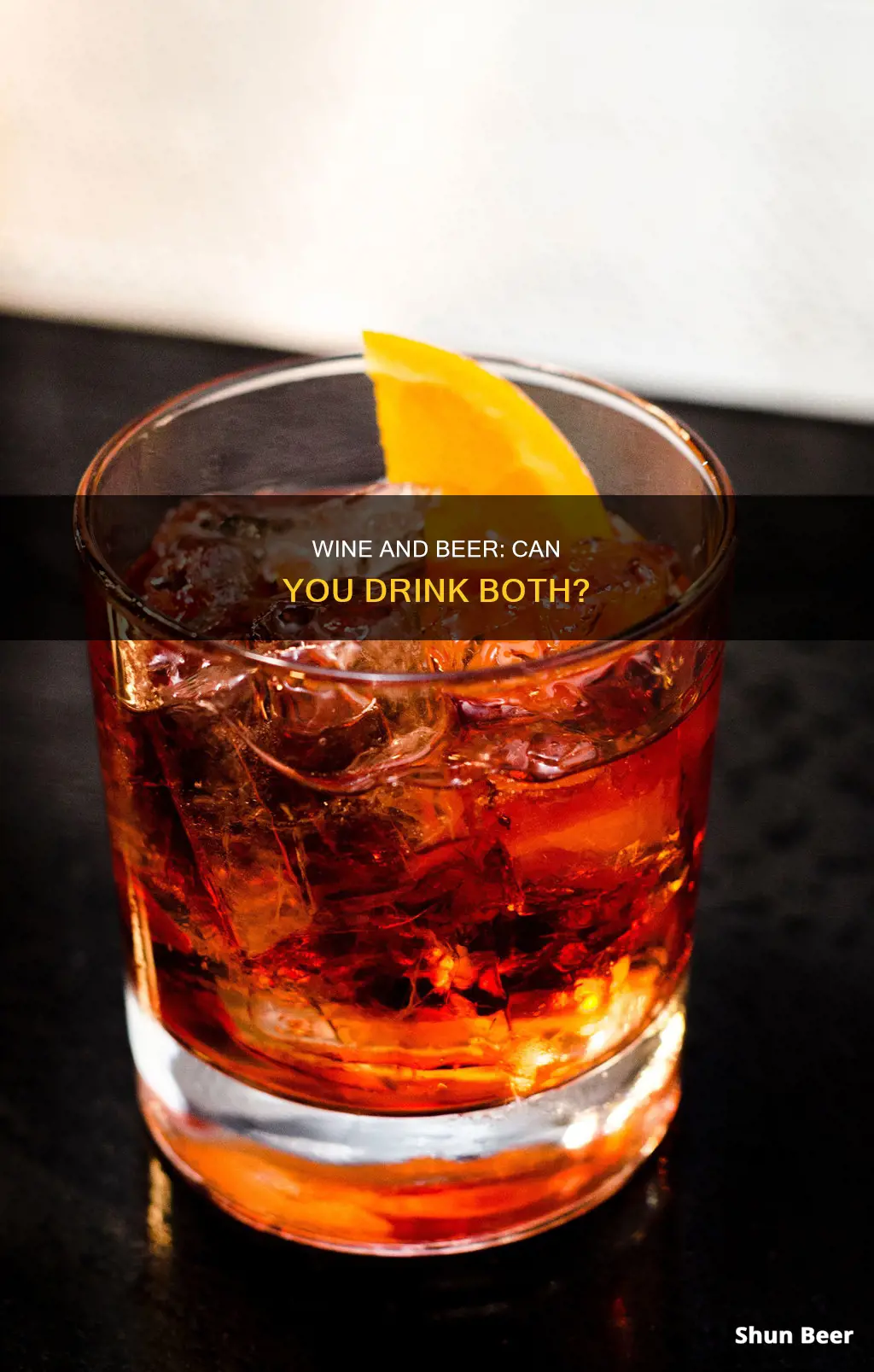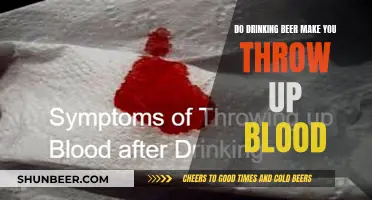
Mixing beer and wine is a controversial topic, with many people advising against it. However, science suggests that it is perfectly fine to drink beer and then wine, or vice versa, and that the order of drinks does not matter. While it is commonly believed that drinking wine after beer will make you feel weird or queer, there is no scientific evidence to support this claim. In fact, a study by researchers at Witten/Herdecke University in Germany and the University of Cambridge in the UK found no significant difference in hangover scores among participants who drank beer followed by wine, or wine followed by beer. The study concluded that it is the total amount of alcohol consumed, rather than the order of drinks, that determines the severity of a hangover. Nevertheless, it is important to always drink responsibly and in moderation to avoid negative consequences such as hangovers or alcohol poisoning.
| Characteristics | Values |
|---|---|
| Beer before wine makes you feel fine | It seems likely due to the lower alcohol content |
| Wine before beer makes you feel queer | Starting on wine is likely to make you drink the lower alcoholic beer quicker, thereby feeling sick. The bubbles are also thought to make the alcohol enter your system quicker. |
| Mixing drinks gets you drunk quicker | People think that mixing drinks gets you drunk quicker, but it's more likely that you're drinking more. |
| Mixing drinks gives you a worse hangover | There's no evidence to back this up, but normally if you're mixing drinks, you're drinking more. |
What You'll Learn

Beer before wine, you'll feel fine
There is a popular saying that goes, "Beer before wine and you'll feel fine; wine before beer and you'll feel queer." This saying is very prevalent and has different versions in many languages. For example, in Germany, they say, "Wein auf Bier, das rat' ich Dir—Bier auf Wein, das lass' sein," which translates to "Wine on beer, I advise you to drink beer on wine."
This saying suggests that drinking beer before wine will result in a milder hangover compared to drinking wine before beer. However, a recent study published in the American Journal of Clinical Nutrition set out to test this theory. The study involved 90 healthy volunteers between the ages of 19 and 40, who were divided into three groups with different drinking orders. The results showed that the order of drinking beer and wine did not significantly affect the severity of hangovers.
So, while the saying "beer before wine, you'll feel fine" may be catchy and memorable, it is not scientifically proven. The severity of a hangover depends on various factors, including individual differences and the total amount of alcohol consumed, rather than the order in which the drinks are consumed.
It is worth noting that the study had some limitations, such as the use of light-colored beverages (lager and white wine) and the challenge of recruiting participants for a non-alcoholic control group. Additionally, previous studies have suggested that certain types of alcohol, such as dark spirits and drinks with more congeners, may indeed influence the intensity of hangovers.
In conclusion, while the specific order of drinking beer and wine may not be a significant factor in hangover severity, it is always important to drink responsibly and in moderation to minimize the negative effects of alcohol consumption.
Beer and Liquor: Mixing Alcohol Safely?
You may want to see also

Wine before beer, you're in the clear
There are many old sayings about the order in which you should drink wine and beer, including "wine before liquor, never sicker", "beer before liquor, never sicker", and "liquor before beer, you're in the clear". However, according to a study by researchers at Witten/Herdecke University in Germany and the University of Cambridge in the UK, the order of drinks does not matter when it comes to hangovers.
In the study, 90 participants aged 19-40 were split into three groups. The first group drank beer and then wine, the second group drank wine and then beer, and the third group drank only wine or beer. The researchers found no significant differences in hangover scores among the three groups. They concluded that "drinking too much of any alcoholic drink is likely to result in a hangover".
Another study by Mythbusters also found that the rate of consumption is what matters when it comes to hangovers, not the order in which drinks are consumed.
So, while the saying goes "wine before beer, you're in the clear", it seems that the order of drinks is not as important as other factors such as how much you drink, how drunk you feel, and whether you vomit after drinking.
Exploring Alcohol Consumption Laws in Pakistan
You may want to see also

Drinking order has no effect on hangover intensity
Drinking wine and beer is a common practice, but what happens if you drink them in the "wrong" order? There is a well-known rhyme that goes, "beer before liquor, never been sicker; liquor before beer, in the clear," which suggests that the order of drinks does matter when it comes to avoiding a hangover. However, this notion has been challenged by researchers who set out to investigate the impact of drinking order on hangover intensity.
In a study conducted by Witten/Herdecke University in Germany and the University of Cambridge in the United Kingdom, 90 participants between the ages of 19 and 40 were divided into three groups. The first group drank beer followed by wine, the second group drank wine followed by beer, and the third group, the control group, drank only wine or beer. The participants were asked to rate their level of drunkenness and well-being throughout the experiment, and the next morning, they rated their hangover symptoms using the Acute Hangover Scale. The experiment was then repeated a week later, with the groups switching their drink orders.
Surprisingly, the researchers found no significant differences in hangover scores among the three groups. Regardless of the order in which they consumed beer and wine, the participants reported similar hangover intensities. This finding contradicts the popular belief that drinking beer before wine will result in a milder hangover compared to the other way around. According to Jöran Köchling, the study's first author, "The truth is that drinking too much of any alcoholic drink is likely to result in a hangover."
So, what does this mean for those who enjoy a drink or two? While the order of drinks may not affect hangover intensity, it is still important to drink responsibly and in moderation. As Dr. Tarek Hassanein, a specialist at the Southern California Liver Centers, states, "Over 30 grams of alcohol for men and over 20 grams for women a day is deleterious to the liver, irrespective of the type of alcohol." Additionally, factors such as vomiting, perceived drunkenness, dehydration, disrupted sleep, and individual differences can contribute to the severity of a hangover. Therefore, it is crucial to listen to your body, pace yourself, and prioritize hydration when consuming alcohol.
In conclusion, while the rhyme "beer before liquor, never been sicker" may be catchy, it is not supported by scientific evidence. The intensity of a hangover is not determined by the order of drinks but rather by the total amount of alcohol consumed and individual factors. So, whether you're drinking wine, beer, or any other alcoholic beverage, remember to drink responsibly and in moderation to minimize the risk of a hangover.
Ozark Beer Choices: What the Characters Drink
You may want to see also

Drinking rate may cause issues
It is important to note that the drinking rate can significantly impact the overall experience and how one feels the next day. Drinking the stronger alcoholic beverage too quickly can lead to a worse hangover. Mixing drinks can also influence the drinking rate, as it may be easier to consume a larger quantity of a lower-alcohol drink in a shorter amount of time. This can lead to drinking more than intended and potentially experiencing more severe hangover symptoms.
The carbonation in beer and other high-CO2 drinks can also affect the drinking rate and overall experience. The bubbles in carbonated beverages can cause the alcohol to be absorbed into the bloodstream more quickly. As a result, drinking a carbonated beverage after wine or stronger alcohols is generally not recommended. The increased absorption rate can lead to a faster onset of intoxication and potentially more severe hangover symptoms.
Additionally, the order in which drinks are consumed may also influence the drinking rate. Starting with a lower-alcohol drink, such as beer, can lead to less intoxication when followed by a stronger drink, such as wine. This is because the lower alcohol content in beer may slow down the rate of consumption, resulting in a lower overall intake of alcohol. On the other hand, starting with a higher-alcohol drink can impair judgment and lead to drinking more heavily later in the evening.
It is worth noting that individual factors such as age, sex, body weight, and drinking habits do not appear to be reliable predictors of hangover intensity. However, vomiting and perceived drunkenness are two factors that are strongly associated with more severe hangovers. Therefore, it is crucial to pay attention to these red flags and adjust one's drinking rate and overall consumption accordingly.
In conclusion, while the drinking rate may not solely determine whether one experiences a hangover, it can certainly influence the severity of hangover symptoms. To minimize the risk of a severe hangover, it is advisable to maintain a moderate drinking rate and be mindful of the potential effects of mixing drinks, carbonation, and the order of consumption.
Beer-Only Diets: A Dangerous, Unhealthy Way to Survive
You may want to see also

Mixing drinks may make you drink more
Secondly, carbonation is believed by some to increase alcohol absorption. Drinking carbonated beverages, such as beer, after wine may accelerate the absorption of alcohol already in the stomach, causing it to rush into the small intestine, where it is more rapidly absorbed. This can lead to a quicker onset of intoxication and potentially encourage further drinking.
Additionally, mixing drinks can create the illusion of reduced alcohol consumption. As individuals mix different types of alcoholic beverages, they may underestimate their actual alcohol intake. This can result in drinking more than intended, increasing the risk of a hangover and other negative consequences.
It is worth noting that while mixing drinks may influence consumption patterns, the ultimate determinant of a hangover is the total amount of alcohol consumed. Drinking in moderation and staying hydrated are key to mitigating hangover symptoms.
Beer Macros: Why They Fail and How to Fix It
You may want to see also
Frequently asked questions
It is believed that drinking beer after wine can make the alcohol already in the stomach rush to the small intestine, where it is absorbed faster. However, studies have shown that the order of drinks does not affect the intensity of a hangover.
Drinking wine, which has a higher alcohol content, before beer might impair your judgment and cause you to drink more heavily later. However, the order of drinks does not affect the intensity of a hangover.
Mixing drinks does not get you drunk faster. However, people who mix their drinks tend to drink more, which can lead to more severe drunkenness and hangovers.
Mixing drinks does not give you a worse hangover. However, people who mix their drinks tend to drink more, which can lead to worse hangovers.
The best way to avoid a hangover is to drink in moderation. It is recommended to have one drink per hour to allow your body to process the alcohol and maintain a steady level of intoxication.







